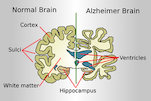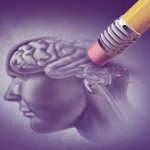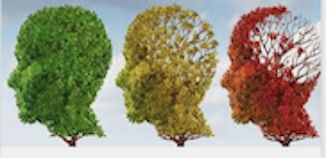Welcome back! Last week, we talked about Histamine Intolerance. If you have chronic health issues that have the doctors stumped, you will want to catch up on this blog. Click HERE to do so.

This week, we are going to talk about memory loss. Specifically, signs to look for if you are concerned about being diagnosed with Alzheimer’s.
Last week, I went out to breakfast with my husband. As we got settled into our seats, I glanced down at my lap, and in abject horror, realized I was still in my nightgown. For a split second, I considered the fact that I could be dreaming. You know those dreams, right? The ones where you are in public in your underwear…or nightgown? Yeah…not so much. I was in my own personal reality and it wasn’t looking good.
Now, my husband will tell you that it was a new nightgown and he thought it was a dress. There’s some truth in there someplace, I’m just not sure where, as I slept next to the man all night in my new “dress“. Regardless of his excuses, I was livid that I had walked out in that nightgown, and A) didn’t notice, and B) neither did he. I ate my eggs in silence, wondering if this was the beginning stages of Alzheimer’s.
I’ll freely admit, that this week’s blog was created with selfish intent. I wanted to research early signs and symptoms of memory loss to see if I needed to make an appointment with my doctor to discuss my concerns.
So what are the signs and symptoms to take note of and when should we see our doctor? Grab a Cup of Coffee and let’s chat.
Signs You May Need To Call Your Doctor

Some signs and symptoms are simply a normal aging process. I will give you examples of things we all experience, then follow up that example with symptoms you may want to examine more closely with your doctor.
Forgetting Recently Learned Information
Do you have trouble remembering people’s names or appointments that you’ve made, but remember them later? No worries. This is a typical age-related change. We all get there. It would be concerning if you keep forgetting recently learned information. Forgetting important dates or events, asking the same questions over and over, and increasingly needing to rely on memory aids (e.g., reminder notes or electronic devices) or family members for things you used to handle on your own.
Working With Numbers

You’ve paid your bills for the month, but get that occasional email that you’ve missed one. No worries. It happens to the best of us. However, if you experience changes in your ability to develop and follow a plan or work with numbers, you may want to take notice. You may have trouble following a familiar recipe or keeping track of monthly bills. You may have difficulty concentrating and take much longer to do things than you did before. These would all be signs to be concerned about.
Getting Lost Driving Home
Having issues remembering how to program your TV to record a program? Ha! Me too! It’s ok…not a worry. But, if you have trouble driving to a familiar location, organizing a grocery list, or remembering the rules of a favorite game, you could be experiencing serious memory loss.
Forgetting Important Events
Have you ever become confused as to what day it is, but figure it out later? Most of us have. Not to worry...it’s when you lose track of dates, seasons, and the passage of time that it becomes problematic. You may have trouble understanding something if it is not happening immediately. Sometimes you may forget where you are or how you got there, all signs of a deeper issue.
Trouble With Balance Or Reading

Have you had to deal with cataracts yet? Perfectly normal sign of aging, but if you experience difficulty with balance or have trouble reading, you should take note. You may also have problems judging distance and determining color or contrast, causing issues with driving.
Trouble Finding Your Words
Do you ever struggle to find that one word you are looking for? That’s normal aging, but if you have trouble following or joining a conversation, stop in the middle of a conversation, and have no idea how to continue, or you regularly repeat yourself, that isn’t normal to the aging process. You may struggle with vocabulary, have trouble naming a familiar object, or use the wrong name (e.g., calling a “watch” a “hand-clock”).
Can’t Find Your Keys
Do you lose things, and retrace your steps to find them again? Not a problem. But if you put things in unusual places, like your paycheck in the refrigerator, that’s something to be concerned about. You may lose things and be unable to go back over your steps to find them again, or you may accuse others of stealing, especially as the disease progresses.
Poor Hygiene
Making a bad decision or mistake once in a while, like neglecting to change the oil in the car, is something we all do, but if you experience changes in judgment or decision-making, such as using poor judgment when dealing with money or pay less attention to grooming or keeping yourselves clean, you may want to get to the doctor.

Withdrawing From Social Activities
Do you sometimes feel uninterested in the family or social obligations? We’ve all hit our wall and due to stress or depression just can’t handle one more thing, but if you find yourself experiencing changes in the ability to hold or follow a conversation, withdraw from hobbies, social activities, or other engagements, or have trouble keeping up with a favorite team or activity, this could signal a problem.
Mood or Personality Changes
Do you get crabby when a routine is disrupted? Maddening, isn’t it? No problem, but if you experience mood and personality changes, become confused, suspicious, depressed, fearful, or anxious, or become easily upset at home, with friends, or when out of your comfort zone, you may have early signs of Alzheimer’s.
When Should I Be Seen?
If you have noticed two or more of these signs and symptoms either in yourself or a loved one, I would greatly encourage you to be seen by a doctor. Early detection is important and there are many things the doctors can offer you if you catch this disease early enough.
Treatment Options
“According to WebMD, Early-onset Alzheimer’s disease is a form of the progressive, memory-robbing brain condition that appears in people before the age of 65. It most often shows up when you’re in your 40s and 50s. But it isn’t unheard of for people to get it as young as their 30s.
“Medications can help with some symptoms of early-onset Alzheimer’s. Your doctor may prescribe drugs to help with memory loss, such as:
- Donepezil (Aricept)
- Galantamine (Razadyne)
- Memantine (Namenda)
- Memantine-donepezil (Namzaric)
- Rivastigmine (Exelon)
“These medicines can delay or improve your symptoms for a few months to a few years. They may give you more time to live independently.
“The doctor may also suggest sleeping pills, antidepressants, or tranquilizers to manage other problems related to Alzheimer’s, like insomnia, night terrors, and anxiety.
“Keep your body in good shape, too. Make sure you eat healthy food and get regular exercise.“
After thoroughly researching this topic, I’ve decided I’m fine for now, but should probably work on limiting the stress in my life. If you or someone you love found several of these signs and symptoms to be true for your life, then I would suggest getting in touch with your physician and having them evaluate you to alleviate your concerns.
That’s all for this week, Dear Reader…see you next time. Until then, be good to yourself and each other.
Editors note: This blog is not a replacement for sound medical advice, and many diseases, disorders, and syndromes have symptoms that overlap. Only a qualified medical professional can diagnose you. That said, if you think this blog may be helpful to others, please hit the Facebook Icon and share it on your personal pages. Thank you for reading us, we really do appreciate you!

This blog mentions “eat healthy foods” but does not define what foods are actually healthy. There is a lot of misunderstanding and misinformation floating around in our culture. If you want to prevent dementia…read the book by the Sherzai’s…The 30 Day Alzheimer’s Solution. You will discover the science on what healthy food choices are. And by the way as you choose to eat more whole plant foods…not only will you be saving yourself but you will also be saving the world.